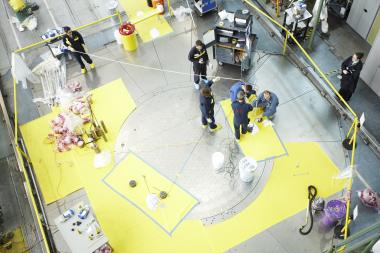Work to return Canada's vital NRU research reactor to operation is ongoing, but timescales could stretch beyond the three months previously outlined.
The 50-year-old reactor at Atomic Energy of Canada's Chalk River research laboratory produces about one third of the world's supply of isotopes for nuclear medicine. However, spots of corrosion have developed on the outside of the vessel that contains the reactor core and its heavy-water reflector.
As a result of the corrosion a small water leak began, which AECL discovered on 15 May. Repairing the vessel requires the removal of the unit's nuclear fuel rods, a laborious process taking three to four weeks which has already started. This unloading and the subsequent re-loading combine as the main factor in the length of the reactor's outage.
 |
| Inspection work at NRU in pictures just released by AECL |
Yesterday, according to a Reuters report, AECL chief Hugh MacDairmid told the House committee on Natural Resources that the three month estimate for the repair was "looking optimistic." He was reluctant to give more information until his company had a fully-formed repair plan.
Michael Binder, head of the Canadian Nuclear Safety Commission, praised AECL's safety culture in dealing with the issue. He confirmed to the committee that small amounts of tritium were present in the heavy water that was leaking. This was being appropriately kept in drums, he said, but nevertheless a small amount was evaporating, meaning that airborne tritium releases from the facility were elevated although below levels that could pose any health risk.
In the meantime, global isotope supplies remain low. Binder said this was "of great concern" to Canadians. With the eventual abandonment of the Maple reactors which would have replaced NRU, the only option for continued isotope supply is a life extension project for NRU. The unit's current licence expires in 2011 and AECL is due to submit a complete assessment of all safety related equipment at the reactor for Binder's consideration in March 2010. Approval for a license extension would mean ten more years of operation.




_30199.jpg)
_72306.jpg)

_49562.jpg)





